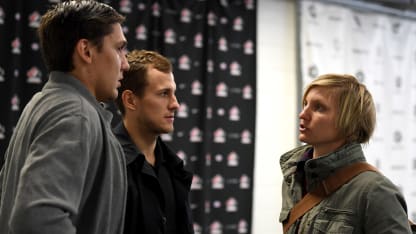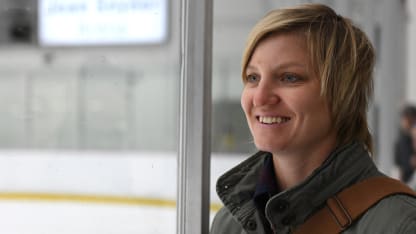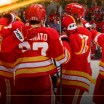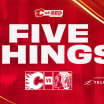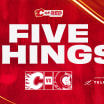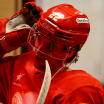"I came to North America when I was 19,'' the 31-year-old Gavrilova recalls of leaving her home in Krasnoyarsk, Siberia to enroll at the University of Minnesota-Duluth, where she earned a degree in accounting. "I could understand better than I could speak at the time. I'd taken lessons because I had to take a test to get into school so I'd been helped by a tutor.
"But it was still hard. Just little things like 'What's up?' You don't understand the context and it blows your mind. You're wondering: 'Why are people asking me how my day is going?' I remember walking through the university hoping I wouldn't bump into anyone on my team because I was worried they'd ask me: 'What's up?'
"It took me six months to pick it up a little better; before I began to feel comfortable."
The idea for Gavrilova, out of hockey the past year following surgery to repair a torn ACL, to help out at WinSport this week was hatched by Flames' assistant GM Brad Pascall, calling on better half Cassie Campbell and her strong ties to the women's game.
"We discussed this option two months ago,'' explains Ray Edwards, the Flames' director of player development and, in a fashion, camp counsellor. "If we're going to have these players - who are under contract - come over, if we're going to invest him in them, we need to help them.
"We can't throw them into the fire, just say: 'Hey, you're here now. Succeed.' Obviously, there's a connection; with Alexander and Zag, right away. They speak the speak. Iya knows what's going on here in Calgary so she's been able to help them in terms of the lay of the land.
"We had her on the bench the other day and at one point I wanted to explain something to Alex. If I don't have her there … well, it's going to take awhile.
"Over time, we'll help these guys with English tutors and different kinds of things.
"But having her now is just, well, a no-brainer."
The experience has been a kick for Gavrilova, too. She now works in the energy sector as an analyst and has made Calgary her home.
"These guys have been really good this week,'' she emphasizes. "Really open-minded, which helps in meetings. They've been encouraged to ask questions, not be afraid. 'We're here to help you.' That's been the message and they've taken it to heart.
"They've really enjoyed themselves. The first thing they noticed, they talked about, is how much everyone has taken care of them. They weren't expecting this. One of them said the first day: 'People have done so much for us, it's crazy.'
"Just the kindness of Canadians and the organization. I think they've possibly been shocked by that, in a good way.
"It's been great for me, too. Just to be around the game again. I've missed it.
"This year, we're going to get a group of girls together and go around Canada, showcasing our game.
"So I'm hoping to be back on the ice in September."
